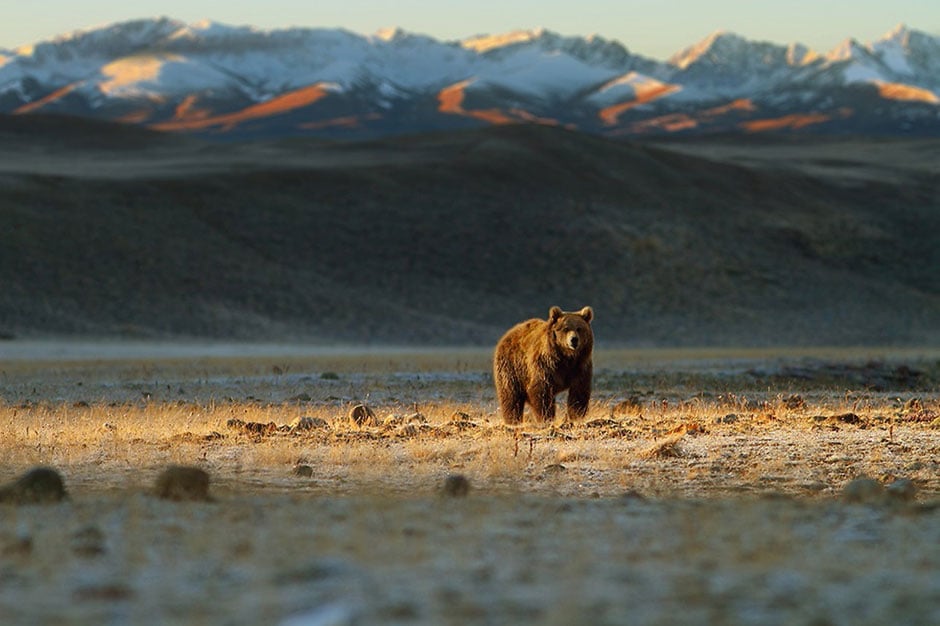
Home to the critically endangered species of brown bears, spectacular landscapes and wildlife, the region of the Deosai Plateau is among the few areas in the world which is intact in its expansive natural area.
It was under the Northern Areas Wildlife Preservation Act 1975 that the Deosai Plateau was declared a national park in 1993 to protect the last remnant population of brown bears in Pakistan.
As per a press statement released by WWF-Pakistan, the remote plateau possesses unique flora and fauna, as it is situated at the confluence of three distinct mountain ranges: western Himalaya, the Ladakh, and the Zanskar. These three ranges merge together to form a complex knot of ranges that channels a variety of large “heroic megafauna” such as the Himalayan brown bear, snow leopard, grey wolf, Siberian ibex, red fox and golden. Its water bodies support significant fisheries values, including the Indus snow trout, Tibetan snow trout and Tibetan stone loach.
 PHOTO: WWF-PAKISTAN
PHOTO: WWF-PAKISTAN PHOTO: WWF-PAKISTAN
PHOTO: WWF-PAKISTANDuring the months between June and October, brown bears make use of Deosai National Park and dependent on snow conditions, they make their way down to the lower valleys in October; where they stay until May or beginning of June.
The GB government plan for this year's Deosai Festival includes polo matches, water sports, horse riding, jeep safaris, cultural melas and an open-air cinema among other recreational activities.
The festival plays an integral role in promoting tourism in the province as well as in the surrounding areas of the country's northern areas, according to the G-B government which has undoubtedly played a vital role, together with conservation organisations in conserving and protecting a habitat which is of national ecological importance.
"Several precautionary measures, including investment of Rs1.5 million, have been taken to ensure protection of the environment at Deosai," Project Director Deosai Festival, Shahzad Shigri said while speaking to The Express Tribune.
 PHOTO: WWF-PAKISTAN
PHOTO: WWF-PAKISTAN PHOTO: WWF-PAKISTAN
PHOTO: WWF-PAKISTANHowever, the proposed dates of this year's festival coincide with the time brown bears roam the Deosai plains in search for food, which brings into question whether the festival should be held in their natural environment.
The festival is said to lure in crowds of tourists, which has a direct impact on the region and its adjoining areas and is therefore opposed by leading environmentalists, including WWF-Pakistan.
According to the GB Tourism office, pamphlets and sign posts have been placed in the area as part of efforts to protect the environment from damage.
 PHOTO: WWF-PAKISTAN
PHOTO: WWF-PAKISTAN PHOTO: WWF-PAKISTAN
PHOTO: WWF-PAKISTANAccording to WWF-Pakistan, brown bears are already suffering from habitat degradation and anthropogenic activities will cause further fragmentation of their species. Events as large as the upcoming festival held in close vicinity to their natural habitat pose a grave threat to their survival.
The said activities are expected to bring with them significant changes to the natural environment. Loss of vegetation, composition changes, soil compaction and erosion caused by holding the festival in the Deosai region would also be a disruption to other wildlife in the area.
In efforts to protect the environment, "the number of events to be held at the festival have been reduced to only those which will not damage the environment," Shigri explained, adding that "designated areas have been made for visitors where they would not be able to cross the set boundaries and lighting too will be limited to the designated areas."
Clean-up operations are said to be conducted everyday following events and "a post clean-up budget has also been put in place," Shigri revealed.
 PHOTO: WWF-PAKISTAN
PHOTO: WWF-PAKISTAN PHOTO: WWF-PAKISTAN
PHOTO: WWF-PAKISTANThe benefits of conservation of the region spread beyond the wildlife as the protected areas contribute significantly to the livelihoods and food security of mountain peoples, Rab Nawaz, Senior Director Programmes, WWF-Pakistan explains.
"Although sustainable tourism is included under three of the Sustainable Development Goals (SDGs), approved by the UN General Assembly last September," it begs the question, "why are we in Pakistan not comprehending and embracing these new set of rules of well-designed and well-managed sustainable tourism?”
 PHOTO: WWF-PAKISTAN
PHOTO: WWF-PAKISTAN PHOTO: WWF-PAKISTAN
PHOTO: WWF-PAKISTANEfforts to steadily increase the population of the brown bears have been successful as the "number of brown bears has shown a steady growth from 19 to 60 per cent annual growth in its population," according to statistics made available by WWF-Pakistan.
Small isolated populations of the species exist in the remote mountainous regions, making it a critically endangered species in Pakistan. The most stable population of the brown bears in in northern Pakistan, Afghanistan, and India is present in Deosai National Park.
As the proposed date for the festival draws near, environmentalists and conservation organisations such as WWF-Pakistan are hoping for the festival to not go ahead. It then becomes the responsibility of the G-B government to implement the proposed precautionary measures to ensure that minimal damage is caused to the environment. The Tourism Department of Gilgit-Baltistan in 2015 also announced a similar festival which was later cancelled. Environmentalists are looking forward to a similar result this year.
[poll id="1500"]
[poll id="1501"]



1732256278-0/ellen-(1)1732256278-0-165x106.webp)
1725877703-0/Tribune-Pic-(5)1725877703-0-165x106.webp)
1732257537-0/Copy-of-Untitled-(64)1732257537-0-270x192.webp)
1726722687-0/Express-Tribune-Web-(9)1726722687-0-270x192.webp)










COMMENTS (5)
Comments are moderated and generally will be posted if they are on-topic and not abusive.
For more information, please see our Comments FAQ